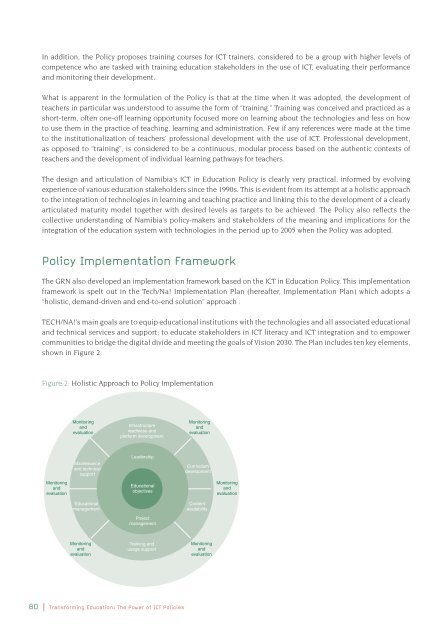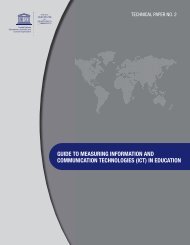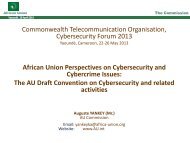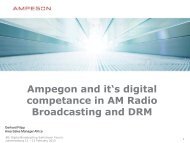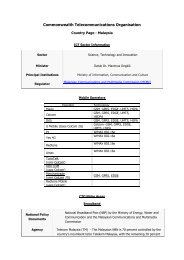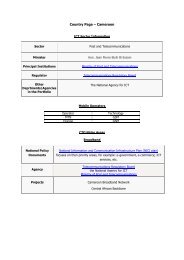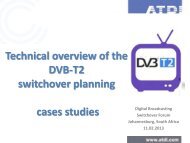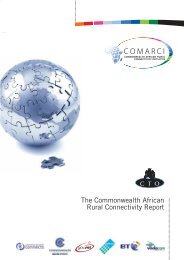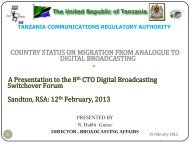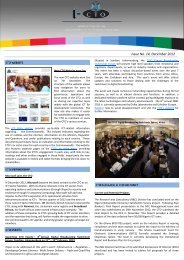Transforming education: the power of ICT policies - Commonwealth ...
Transforming education: the power of ICT policies - Commonwealth ...
Transforming education: the power of ICT policies - Commonwealth ...
Create successful ePaper yourself
Turn your PDF publications into a flip-book with our unique Google optimized e-Paper software.
In addition, <strong>the</strong> Policy proposes training courses for <strong>ICT</strong> trainers, considered to be a group with higher levels <strong>of</strong><br />
competence who are tasked with training <strong>education</strong> stakeholders in <strong>the</strong> use <strong>of</strong> <strong>ICT</strong>, evaluating <strong>the</strong>ir performance<br />
and monitoring <strong>the</strong>ir development.<br />
What is apparent in <strong>the</strong> formulation <strong>of</strong> <strong>the</strong> Policy is that at <strong>the</strong> time when it was adopted, <strong>the</strong> development <strong>of</strong><br />
teachers in particular was understood to assume <strong>the</strong> form <strong>of</strong> “training.” Training was conceived and practiced as a<br />
short-term, <strong>of</strong>ten one-<strong>of</strong>f learning opportunity focused more on learning about <strong>the</strong> technologies and less on how<br />
to use <strong>the</strong>m in <strong>the</strong> practice <strong>of</strong> teaching, learning and administration. Few if any references were made at <strong>the</strong> time<br />
to <strong>the</strong> institutionalization <strong>of</strong> teachers’ pr<strong>of</strong>essional development with <strong>the</strong> use <strong>of</strong> <strong>ICT</strong>. Pr<strong>of</strong>essional development,<br />
as opposed to “training”, is considered to be a continuous, modular process based on <strong>the</strong> au<strong>the</strong>ntic contexts <strong>of</strong><br />
teachers and <strong>the</strong> development <strong>of</strong> individual learning pathways for teachers.<br />
The design and articulation <strong>of</strong> Namibia’s <strong>ICT</strong> in Education Policy is clearly very practical, informed by evolving<br />
experience <strong>of</strong> various <strong>education</strong> stakeholders since <strong>the</strong> 1990s. This is evident from its attempt at a holistic approach<br />
to <strong>the</strong> integration <strong>of</strong> technologies in learning and teaching practice and linking this to <strong>the</strong> development <strong>of</strong> a clearly<br />
articulated maturity model toge<strong>the</strong>r with desired levels as targets to be achieved. The Policy also refl ects <strong>the</strong><br />
collective understanding <strong>of</strong> Namibia’s policy-makers and stakeholders <strong>of</strong> <strong>the</strong> meaning and implications for <strong>the</strong><br />
integration <strong>of</strong> <strong>the</strong> <strong>education</strong> system with technologies in <strong>the</strong> period up to 2005 when <strong>the</strong> Policy was adopted.<br />
Policy Implementation Framework<br />
The GRN also developed an implementation framework based on <strong>the</strong> <strong>ICT</strong> in Education Policy. This implementation<br />
framework is spelt out in <strong>the</strong> Tech/Na! Implementation Plan (hereafter, Implementation Plan) which adopts a<br />
“holistic, demand-driven and end-to-end solution” approach .<br />
TECH/NA!’s main goals are to equip <strong>education</strong>al institutions with <strong>the</strong> technologies and all associated <strong>education</strong>al<br />
and technical services and support; to educate stakeholders in <strong>ICT</strong> literacy and <strong>ICT</strong> integration and to em<strong>power</strong><br />
communities to bridge <strong>the</strong> digital divide and meeting <strong>the</strong> goals <strong>of</strong> Vision 2030. The Plan includes ten key elements,<br />
shown in Figure 2.<br />
Figure 2: Holistic Approach to Policy Implementation<br />
Monitoring<br />
and<br />
evaluation<br />
Monitoring<br />
and<br />
evaluation<br />
Maintenance<br />
and technical<br />
support<br />
Educational<br />
management<br />
Monitoring<br />
and<br />
evaluation<br />
Infrastructure<br />
readiness and<br />
platform development<br />
Leadership<br />
Educational<br />
objectives<br />
Project<br />
management<br />
Training and<br />
usage support<br />
80 | <strong>Transforming</strong> Education: The Power <strong>of</strong> <strong>ICT</strong> Policies<br />
Monitoring<br />
and<br />
evaluation<br />
Curriculum<br />
development<br />
Content<br />
availability<br />
Monitoring<br />
and<br />
evaluation<br />
Monitoring<br />
and<br />
evaluation


